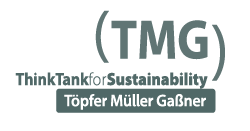Navigating digitalization in disaster risk reduction
Digital technologies initially lauded for emergency response in post-2010 Haiti earthquake, but mismanagement of resources and barriers to local input exposed disconnect with local communities.
by Dr. Elena Lazutkaite; Dr Ahmed Amdihun; Alexander Müller | 2023-06-30

In the aftermath of the 2010 earthquake that devastated Haiti, digital technologies were hailed as a critical tool for emergency response. Mobile phones and Global Positioning System (GPS) were used to coordinate search, rescue efforts and create open-source maps for affected areas, and to galvanize support through social media. However, as the dust settled, Haiti emerged as a sobering case study for the complex interplay between data, information, and power and an illustration of the disconnect between digital approaches and local communities.
The disconnect
One of the starkest illustrations of digitalization falling short in achieving its goals was the American Red Cross fundraising campaign, which successfully raised nearly half a billion USD in donations. Investigative reports by ProPublica and NPR brought to light the mismanagement of these resources, highlighting a failure to deliver on the promised assistance to the victims of the devastating earthquake. These reports revealed the profound disconnect between the generous contributions in the digital realm and the actual impact on the ground.
Furthermore, attempts by civil society leaders to provide local intelligence in person rather than digitally were thwarted by protocols that barred their entry into the United Nations Logbase, where critical discussions and decisions were taking place. Access was restricted to those affiliated with international organizations, resulting in a huge gap between Haitians and the emergency response organizations that hindered the integration of valuable information into disaster response.
Early Warning-Early Action Systems
More than a decade has passed since the Haiti disaster, and we are still grappling with the challenges of digitalization and its implications for disaster risk reduction (DRR). In May 2023, countries met to review progress on implementing the Sendai Framework for DDR — a landmark 2015 agreement to reduce damage, losses, and deaths from natural and human-induced hazards by the end of the decade. During this High-Level Meeting of the United Nations General Assembly (UNGA), advancement in the use of technology and Early Warning-Early Action Systems was noted. However, progress has not kept pace with the urgency of our times, as the known number of people affected by disasters has surged by 80-fold since 2015.
Acknowledging both the urgency conveyed during the UNGA meeting and the need for effective solutions, it is crucial to place end users and beneficiaries at the forefront of programming before embarking on the implementation of digital solutions in DDR. One key consideration is understanding the local context and the scope of the problem, as well as limitations.
IGAD’s Climate Prediction and Applications Centre (ICPAC) based in Nairobi, Kenya, and TMG Research gGmbH are working together on governance of Early Warning-Early Action Systems to tackle compounding disaster risks in the IGAD region, which is experiencing increasing climate change and socio-economic vulnerabilities. The traditional approach to understanding risks and emergencies is no longer sufficient, and we are researching and designing innovative digital solutions that are regionally led, nationally owned, and locally implemented.
Reaching the last mile
While reaching the last mile remains a persistent challenge, ICPAC has made strides in pilot projects such as Husika an Early Warning mobile application that provides smallholder farmers in Kenya, Somalia, and Uganda with customized weather information, crop advisories, and early warning alerts, showing promising results.
As millions of people in the Horn of Africa try to recover from five consecutive failed rainy seasons, Husika could play a crucial role in helping farmers to manage their crops during prolonged periods of drought. The challenge is to move from pilots to scale. This requires a concerted effort from all stakeholders and financing for regional, national, and local actors.
What needs to be done differently?
Digitalization is not a panacea for all our problems, but a double-edged sword that can cut both ways. At a local community level, the understanding and usage of technology to anticipate disaster risks remains insufficient in the IGAD region where internet connectivity is low and electricity supplies erratic. To navigate the intricate landscape of digitalization in DDR, we must recognize the profound and unique challenges faced by developing countries.
Deliberate and targeted investments are needed to promote “digital leapfrogging” within initiatives driven by and for communities in the Global South. This requires openness to diverse perspectives, and accountability throughout the implementation process.
Ultimately, as emphasised by UN Deputy Secretary-General Amina Mohammed, “our world is at a defining point in history. As we review our journey halfway to 2030, we must acknowledge that progress has been weak and insufficient”. It is imperative that we reflect on our collective failure to break the cycle of natural disasters turning into widespread humanitarian crises, as witnessed in Haiti, eastern Africa, and beyond. By facing past mistakes and present limitations head-on, we can forge a future that holds promise and resilience for all.
 Urban Food FuturesFeb 09, 2026
Urban Food FuturesFeb 09, 2026Pushing the horizon: Urban farming and community-led innovation in Mukuru informal settlement
A small community-run greenhouse in Mukuru is offering insights into how controlled-environment agriculture can strengthen food security in urban environments under increasing pressure—and a look into the future of food systems in informal settlements.
Christian Sonntag, Emmanuel Atamba, Lumi Youm
 Land GovernanceDec 18, 2025
Land GovernanceDec 18, 2025Land tenure, women’s land rights, and resilience: Reflections from CRIC23 toward UNCCD COP17
Our experts discuss what the exchanges at CRIC23 highlighted and revealed about the role of secure and gender-equitable land tenure in the UNCCD's work ahead of the 2026 triple COP year.
Frederike Klümper, Washe Kazungu
 Urban Food FuturesDec 09, 2025
Urban Food FuturesDec 09, 2025The story of Mukuru's Urban Nutrition Hub
In Mukuru informal settlement, a safe haven for women has grown into the Urban Nutrition Hub, a multi-purpose space for nutrition education, training, and community development, demonstrating the potential of grassroots community-owned innovation..
Serah Kiragu-Wissler


